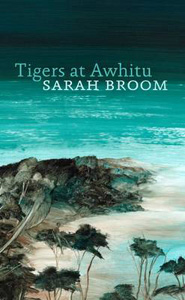The judges are delighted to announce the three finalists for the Sarah Broom Poetry Prize 2015.
The prize attracted almost 200 entries from across the spectrum of New Zealand poets, from the new and emerging to the established and the iconic. The shortlist was chosen by the 2015 guest judge, Irish poet Vona Groarke.
The finalists are:
Diana Bridge: a Wellington-based poet, the author of five collections, including aloe & other poems (2009).
Alice Miller: a New Zealand poet based in Vienna, whose first book The Limits was published in 2012.
Ashleigh Young: a Wellington-based editor, essayist, and poet, whose first collection of poetry, Magnificent Moon, was published in 2012.
“The Sarah Broom Poetry Prize is about celebrating poetry,” says judging panel member Sarah Ross. “The diversity of the entries received, and the tonal and formal complexity of the best work, its deftness, its moments of insight, poignancy, and humour – all of this has made the judging process enormously rewarding. So too has working with the generous and perceptive Vona Groarke.”
The Sarah Broom Poetry Prize aims to make a substantial ongoing contribution to supporting poetry in New Zealand. The value of the prize is $12,000 in 2015.
The three finalists will read in a free session at the Auckland Writers Festival on Sunday 17 May from 1.30-2.30pm in the Upper NZI Room, Aotea Centre, Auckland. Vona Groarke will announce the winner at this event
Queries should be emailed to: enquiries@sarahbroom.co.nz
For photos or other details of finalists please email sarahceross@gmail.com
For more information about Sarah Broom or the Poetry Prize visit www.sarahbroom.co.nz
FINALIST DETAILS:
Photo credit: Simon Woolf
Diana Bridge has published five collections of poems, the latest of which, aloe & other poems, came out in 2009. She was awarded the Lauris Edmond Memorial Award in 2010, for her distinguished contribution to New Zealand poetry, and her essay, ‘An attachment to China’ won the 2014 Landfall essay competition. Diana is based in Wellington.
Vona Groarke writes: “Whether it is the violence of medieval history, the engagement with nature, or a re-imagining of Ovid that is the subject, Diana Bridge’s poetry has authority and elegance. Technically sophisticated, this work is complex but never obscure; lyrically charged but never sentimental. It is unflinching in its observational commitment, but also enjoys its ability to fashion unusual and arresting imagery. There is a kind of fierce beauty to this work, alongside its rigorous intellect and formal grace. In a description that rings true of much of her work, her poem ‘Prospero’s Stones’ notes, ‘driven phrases that lap /around each other’: this is a poetry that is linguistically alert, but that also remembers to ply sound and meaning into the kind of poetic weave that is colourful and playful, but also careful, thoughtful and wise.”
Photo Credit: Dylan Whiting
Alice Miller’s first book The Limits was published by Auckland University Press and Shearsman in 2014. She is a graduate of the International Institute of Modern Letters and the Iowa Writers’ Workshop. Last year she was a Grimshaw Sargeson Fellow, a Visiting Writer at Massey University, and a resident at the Michael King Centre. She is based in Vienna.
Vona Groarke writes: “The ‘I’ and ‘We’ of Alice Miller’s poetry are rarely familiar and never predictable. The same is true of her poems, which are fully-charged and teem with surprises of imagery, narrative and language. Nothing moves in a straight line in this work: instead, the poems tend to turn on small pockets of beguiling mystery. Characters emerge out of an apparent nowhere and do the darndest things before they slip off again, as if in secret, out of the sightline of the poem. It all makes for an intense and intensely involving experience: the lines are so well managed and the narrative so deftly and subtly manoeuvred as to leave one ruffled, but pleasantly so. What might seem like aphorism turns out to be a strange and complicated proposition, as in ‘Saving’ where, ‘some of the moments we cling to most / are the futures we never let happen’. This is work that turns on a sixpence, and that manages each of its fascinating turns with assurance and aplomb.”
Ashleigh Young is an editor, essayist, and poet. Her first collection of poetry, Magnificent Moon, was published by Victoria University Press in 2012, and recent work appears in Sport, The Griffith Review, Five Dials, and Tell You What. She co-teaches a workshop in science writing at Victoria University with science writer Rebecca Priestley, and she blogs, mostly about cycling, at eyelashroaming.com. Ashleigh is based in Wellington.
Vona Groarke writes: “Ashleigh Young’s poems defy their tight spaces to offer expansive and resonant narratives. Hers is a poetic world that derives great charge and vigour from proper nouns – named people and places -and specific, beautifully delineated detail that, as in flash fiction, sparks an entire world to life. People talk to each other in these poems, and whole lives get encapsulated in the kind of language that is as exact as it is vivid, as careful as it concise. Take for instance, ‘Electrolarynx’ with its arresting line: ‘Then our silence made a condemned building of us all’, or the opening of ‘Become road’: ‘When the car stops we are beginning already to become road’. These are poems that begin with the familiar, and then carefully walk it to the edges of perception, where it catches the light in arresting, singular and finely memorable ways.”





